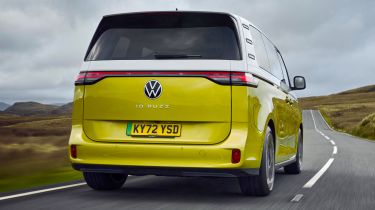Volkswagen ID. Buzz: running costs & insurance
Prices may be high but zero road tax and a decent length warranty are always appealing
The Volkswagen ID. Buzz is far from being the cheapest electric family car on the market today, with prices ranging from over £59,000 up to around £70,000 for the top-spec GTX. Thankfully, low running costs help to make up for the steep price tag (at least a little bit).
Like all electric cars and vans, you’ll pay zero VED road tax until April 2025. Company car tax is much lower than for any petrol or diesel alternatives, too, and even servicing should be relatively inexpensive.
Volkswagen ID. Buzz insurance group
It may carry a rather premium price tag, but the Volkswagen ID. Buzz is fairly middling when it comes to insurance. The whole line-up sits between insurance groups 31 and 33, so premiums should be pretty average provided you’re an experienced driver with a good few years of no-claims under your belt. That being said, don’t go expecting any phenomenal bargains.
Warranty
The ID. Buzz is covered by a three-year/100,000-mile warranty. You can extend this plan if you wish via a one-off or monthly payment, but as is, it should provide you with plenty of coverage if you’re on a three-year finance deal. Meanwhile, the battery itself is covered for eight years or 100,000 miles, whichever comes first.
Servicing
Like all electric cars, the ID. Buzz should be generally cheaper to maintain and service than any combustion-engined alternative. It also follows the same fixed service schedule as the rest of Volkswagen’s ID. family of EVs, which means you only need to get it looked at every two years. Volkswagen currently includes the first MOT, three brake fluid changes and three pollen filter charges in the purchase price of the ID. Buzz.
Road tax
As with all zero-emissions cars, the ID. Buzz doesn't attract any road tax. That will change in April 2025, but for now it's one less cost to worry about. Electric cars also enjoy a 2% Benefit-in-Kind (BiK) tax rate, so company car drivers will certainly feel the benefit.

